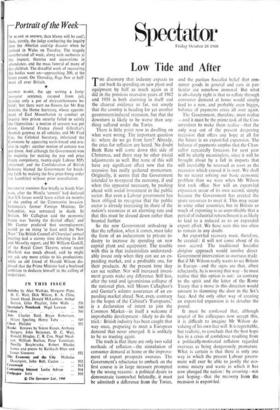Low Tide and After
HE discovery that industry expects to 1 cut back its spending on new plant and equipment by half as much again as it did in the previous recession years of 1962 and 1958 is both alarming in itself and the clearest evidence so far, not simply that the country is heading for yet another government-induced recession, but that the downturn is likely to be worse than any- thing suffered under the Tories.
There is little point now in dwelling on what went wrong. The important question is: where do we go from here? Already, the cries for reflation are heard. No doubt Bank Rate will come down this side of Christmas, and there may be other trivial adjustments as well. But none of this will have any significant effect now that the recession has really gathered momentum. Originally, it seems that the Government intended to re-expand the economy, if and when this appeared necessary, by pushing ahead with social investment in the public sector. But even a Labour government has been obliged to recognise that the public sector is already increasing its share of the nation's resources at an alarming rate and that this must be slowed down rather than boosted further.
So the new Government orthodoxy is that the reflation, when it comes, must take the form of an inducement to private in- dustry to increase its spending on new capital plant and equipment. The trouble with this is that industrialists understand- ably invest only when they can see an ex- panding market, and a profitable one, for their products. At the present time they can see neither. Nor will increased invest- ment grants make any difference. Still less, after the total and ignominious collapse of the national plan, will Messrs Callaghan's and Gunter's solemn assurances of an ex- panding market ahead. Nor, even, contrary to the hopes of the Cabinet's 'Europeans,' is a declaration of intent to join the Common Market—in itself a welcome if improbable development—likely to do the trick : British industry has been caught that way once, preparing to meet a European demand that never emerged. It is unlikely to be so trusting again.
The truth is that there are only two valid methods of reflation—the stimulation of consumer demand at home or the improve- ment of export prospects overseas. The Government's reluctance to embark on the first course is in large measure p?ompted by the wrong reasons: a political desire to demonstrate (somewhat belatedly, it must be admitted) a difference from the Tories, and the puritan Socialist belief that con- sumer goods in general and cars in par- ticular are somehow immoral. But what is absolutely right is that to reflate through consumer demand at home would simply lead to a new, and probably even bigger, balance of payments crisis all over again.
The Government, therefore, must realise —and it must be the prime task of the Con- servatives to make them realise—that the only way out of the present deepening recession that offers any hope at all for the future is an export-led expansion. The balance of payments surplus that the Chan- cellor repeatedly forecasts for next year will be utterly meaningless, since it will be brought about by a fall in imports that will inevitably be reversed as soon as the recession which caused it is over. We shall be no nearer solving our basic economic problem than we were when Mr Wilson first took office. Nor will an export-led expansion occur of its own accord, simply because the Government has created the spare resources to meet it. This may occur in some other countries; but in Britain so much of exporting is so unprofitable that a period of industrial retrenchment is as likely to lead to a reduced as to an expanded export effort. We have seen this too often to remain in any doubt.
An export-led recovery must, therefore, be created: it will not come about of its own accord. The traditional Socialist dirigiste approach would involve direct Government intervention in overseas trade. But if Mr Wilson really wants to see Britain in Europe—and the signs are that, albeit reluctantly, he is moving that way—he must realise that this option is out: so contrary to the spirit and the letter of the Rome Treaty that a move in this direction would amount to slamming the door in the Six's face. And the only other way of creating an export-led expansion is to devalue the pound.
It must be confessed that, although several of his colleagues now accept this, it is difficult to imagine Mr Wilson de- valuing of his own free will. It is regrettable, but realistic, to conclude that the best hope lies in a crisis of confidence resulting from a politically-motivated reflation regarded overseas as being dangerously premature. What is certain is that there is only one way in which the present Labour govern- ment will ever be able to justify the eco- nomic misery and waste in which it has now plunged the nation : by ensuring—not just hoping—that the recovery from the recession is export-led.






































 Previous page
Previous page